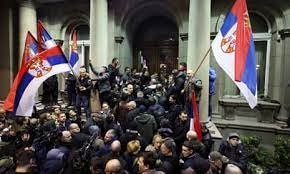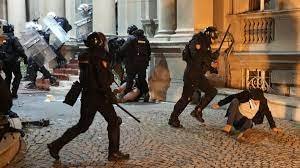
In the heart of Eastern Europe, Serbia, a nation steeped in a tumultuous political past, now stands at the crossroads of history, grappling with a maelstrom of discontent and allegations of election fraud. The streets of Belgrade, once symbols of resilience and hope, now echo with the tumultuous cries of a populace caught in the throes of a political storm.
A Prelude to Chaos: Allegations Cast a Long Shadow
The genesis of this unrest traces back to the aftermath of the December 17 elections, where the Serbia Against Violence opposition coalition raised a clarion call, alleging election fraud and irregularities that cast a dark shadow over the democratic process. The political arena, once a stage for ideological battles, now transforms into a battleground of accusations, promising repercussions far beyond the confines of the polling booths.
Transitioning from Accusations to Action: The Brewing Storm
Initially, the response to these allegations took the form of peaceful protests—a hallmark of democratic dissent. Thousands converged in Belgrade, expressing their discontent through the power of unity. Yet, the façade of peace shattered as demonstrators, fueled by a fervor for justice, attempted to storm the iconic Belgrade City Hall.
Belgrade City Hall: A Symbolic Battleground
The choice of Belgrade City Hall as the focal point of these protests adds a layer of symbolism to the turmoil. The historic edifice, standing as a testament to the city’s rich history, is thrust into the center of a maelstrom, its walls now witnessing the collision of political ideologies and the fervor for change.
The Escalation: From Peaceful Dissent to Violent Uprising
As the sun dipped below the horizon, the once-peaceful demonstrations transformed into a disconcerting spectacle of a violent uprising. The clash between protesters and law enforcement became a stark reminder of a nation torn between its aspirations and the harsh realities of political strife.
The Detentions: A Consequence of Unrest
In the aftermath of the clashes, Serbian police detained at least 38 individuals, a stark reflection of the government’s resolve to quell what President Vucic deemed an “attempted violent takeover of the state institutions of the Republic of Serbia.”
Opposition’s Battle Cry: Demands for Electoral Integrity
Post-chaos, opposition leaders, notably the center-left Serbia Against Violence alliance, intensified their calls for the annulment of the elections. Their demand stems from the belief that the electoral process was marred by irregularities, casting doubt on the fundamental tenets of democracy.
The Echoes of Discontent: Opposition’s Stance on Electoral Integrity
In a press conference mirroring the sentiments of a nation grappling with uncertainty, opposition leaders expressed deep concerns over the alleged irregularities. Their demands transcend mere political posturing, representing a collective call for transparency and fairness in the democratic process.
President Vucic’s Address: Urging Calm Amidst the Storm
Responding to unfolding events, President Vucic took to the airwaves, urging calm and denouncing the violence that gripped the nation. His address sought to quell the storm, emphasizing the need for respect for democratic processes while categorically labeling the protests as an attempt at a violent takeover.
Navigating the Political Storm: President Vucic’s Conundrum
President Vucic, facing one of the most significant challenges of his political career, finds himself at a crossroads. Balancing the demands of a restless populace with the need to maintain the stability of the nation requires a delicate dance, one that will shape the future trajectory of Serbia.
International Observers: Concerns and Calls for Peaceful Resolution

As news of Serbia’s unrest reverberated across borders, international observers expressed deep concerns over the situation. The protests, initially a manifestation of political discontent, have evolved into a broader challenge to the democratic process. The international community is closely monitoring developments and calling for a peaceful resolution to the crisis.
The Global Watch: International Community’s Stance
Expressions of concern from foreign governments and international organizations underscore the gravity of the situation in Serbia. The unrest, seen through the lens of the international community, is not merely a domestic affair but a litmus test for the resilience of democratic values.
Implications for Serbia: A Nation at the Crossroads
The ongoing unrest in Serbia carries profound implications, both domestically and on the international stage. The allegations of election fraud and the subsequent violent protests have cast a shadow over the political landscape, leaving the nation at a critical juncture in its journey towards democratic maturity.
The Political Landscape: Navigating Uncertainty
Serbia’s political landscape, already marked by historical complexities, is now navigating uncharted waters. The government’s response to the allegations and the opposition’s unwavering stance on electoral integrity will not only define the immediate future but also cast a long shadow on the nation’s political trajectory.
Calls for Dialogue: A Glimmer of Hope Amidst the Chaos
Amidst the chaos, there are discernible calls for dialogue between the government and the opposition. A peaceful resolution is crucial to prevent further escalation and ensure the stability of the democratic institutions in Serbia.
Seeking Common Ground: The Imperative of Dialogue
The call for dialogue is not just a pragmatic necessity; it is a lifeline that can steer Serbia away from the brink of further chaos. In the realm of political discourse, finding common ground becomes paramount for the nation’s stability.
The Unraveling Tapestry of Serbia’s Unrest

Serbia finds itself entangled in a complex tapestry of unrest, with each thread representing a facet of the nation’s struggle for political expression. As the protests continue and the echoes of discontent reverberate through the streets, the path forward for Serbia remains uncertain.










